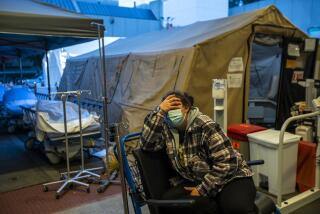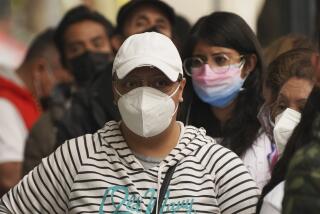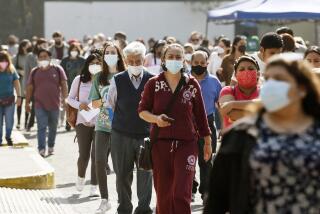Mexico’s fragile health system running out of room for coronavirus patients
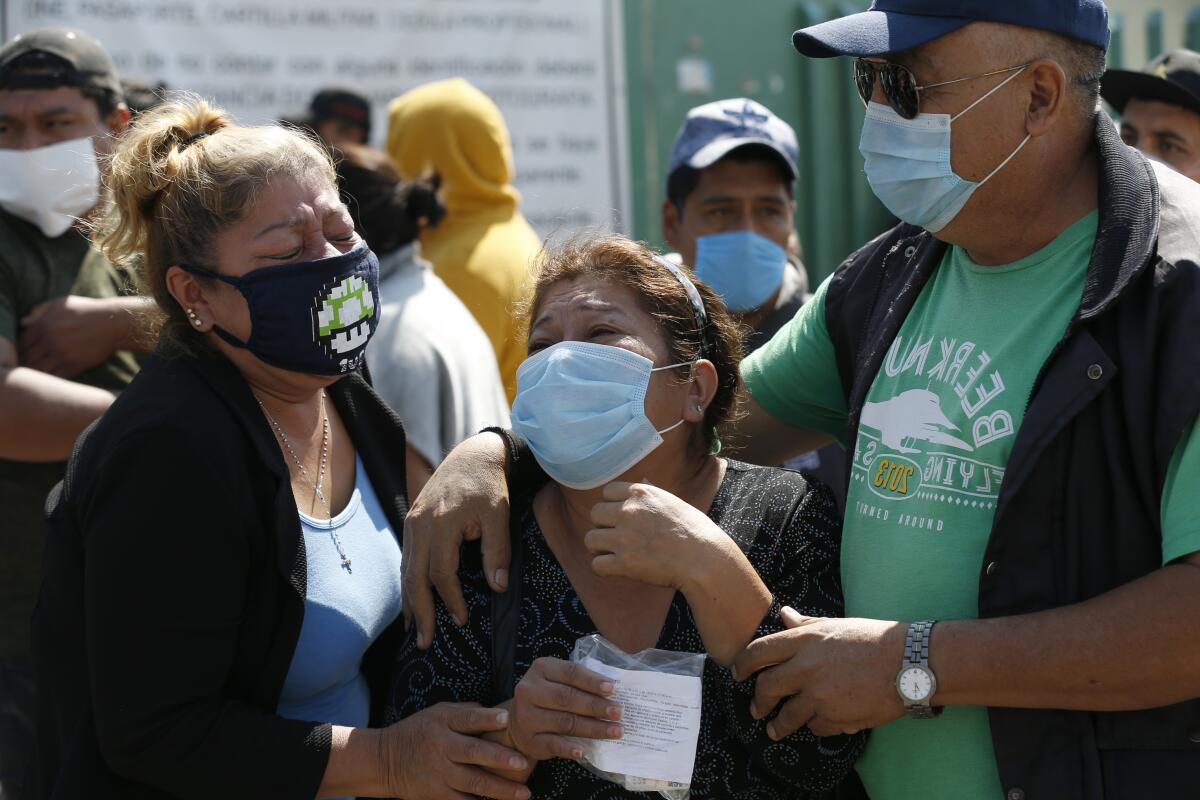
- Share via
MEXICO CITY — They waited for hours outside Las Américas hospital for word about their loved ones.
Then the small group ran out of patience and stormed inside. Upon discovering bodies on gurneys packed into the pathology ward, they accused the staff of murder.
“I unzipped the bag of my son to confirm that it was him,” María Dolores Castillo later told a television interviewer, describing how she touched his head. “My son was still warm!”
The coronavirus pandemic has battered sophisticated healthcare systems in Europe and the United States. Mexico is in another category.
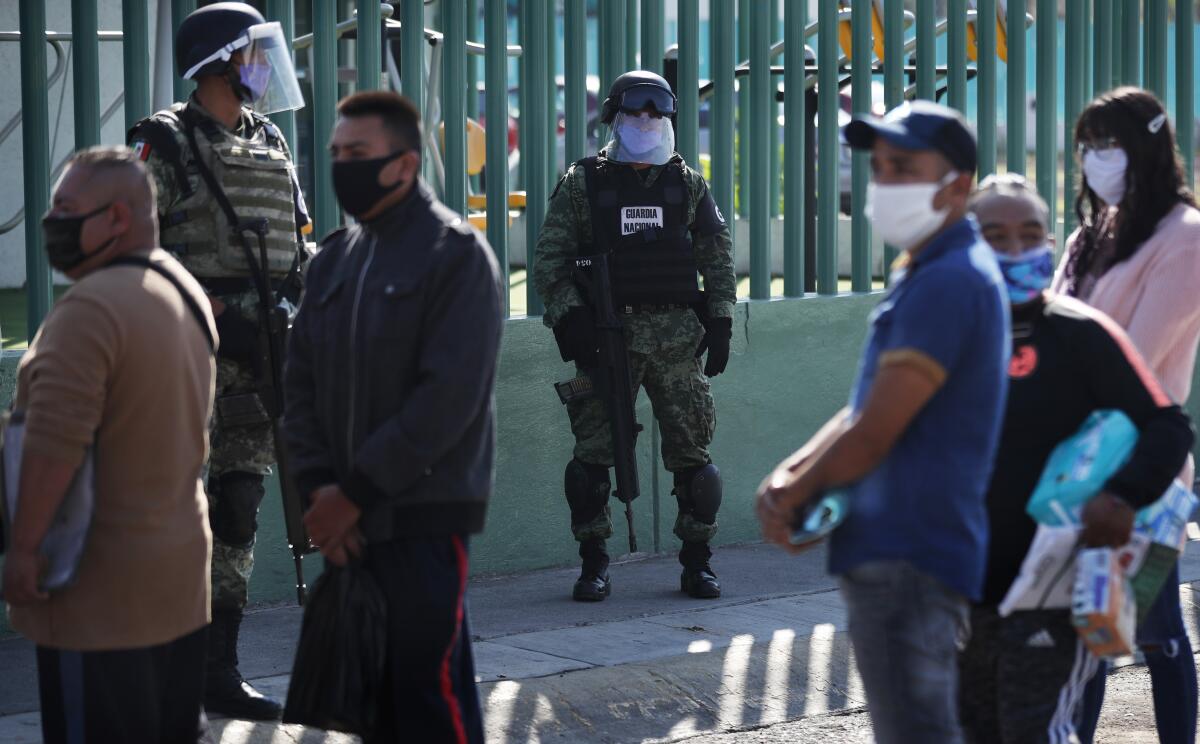
The country’s fragile medical infrastructure appears to be in danger as hospitals become overloaded. The unrest at the hospital Friday in Ecatepec, a gritty suburb of Mexico City, attracted widespread attention and became a potent symbol of how the public is losing patience.
After authorities dispatched dozens of national guard troops and state police officers in riot gear to quell the disturbance, hospital officials vowed to improve communication with families.
The capital and adjoining areas in the state of Mexico — a metropolitan area that is home to more than 22 million people — account for 44% of the country’s confirmed 24,905 coronavirus cases and almost a third of the 2,271 deaths.
Because relatively little testing has been done, officials acknowledge that the real numbers are probably much higher. Using estimates based on modeling, Mexican health authorities said they expected cases to peak this week.
Medical professionals, who complained publicly for weeks about shortages of masks and other necessities, have expressed growing alarm.
“The situation in the hospitals in Mexico City is critical — basically I can tell you that we are at war,” Dr. Magdalena Madero, chief of kidney care at the National Institute of Cardiology, told Mexico’s W Radio last week.
Struggling with a lack of ventilators, overwhelmed physicians face “drastic” decisions about whom to save, she said.
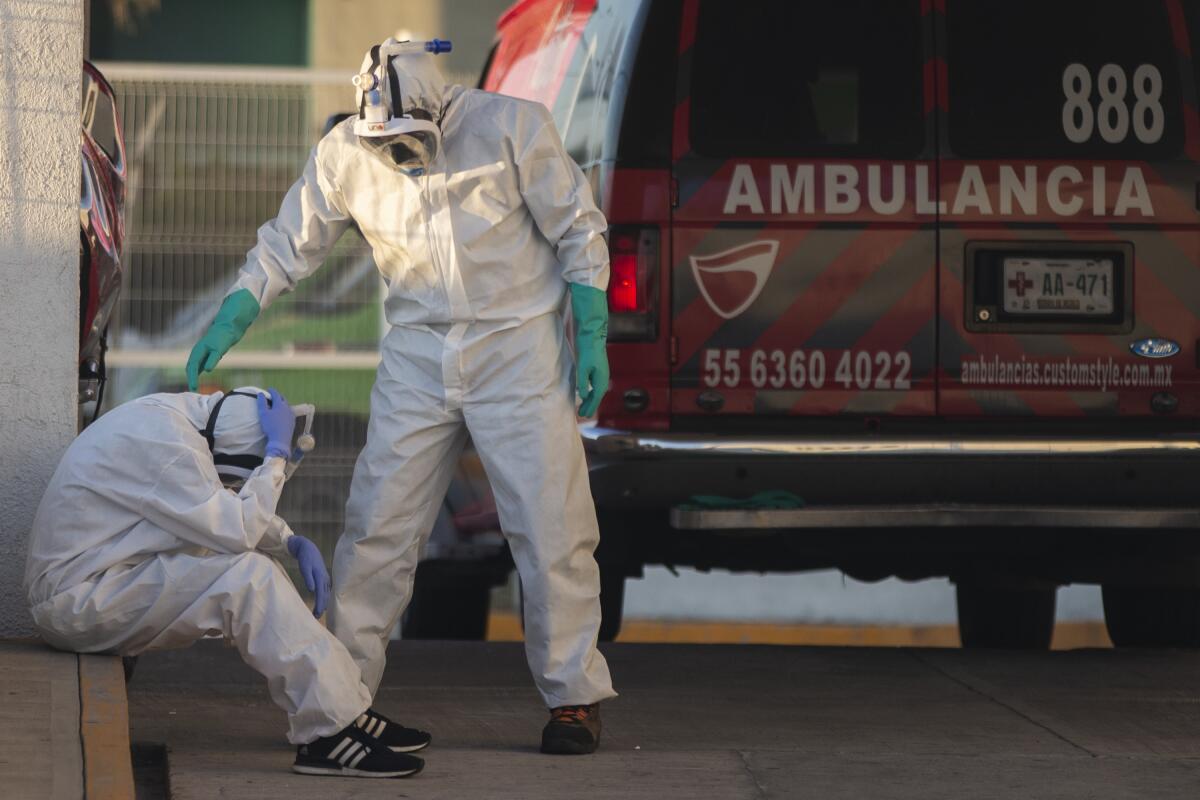
“For those patients who have little possibility of moving forward, we can offer them palliative treatments, basically compassionate sedation,” Madero said. “There is a brutal frustration among our health personnel.”
Such dire warnings contrast sharply with official reassurances, notably from President Andrés Manuel López Obrador.
“Look, we don’t have problems with hospital beds,” the president told reporters last week. “Fortunately, until now we have the capacity to attend to the sick.”
He blamed conservative opponents for disseminating “false news” accounts of people denied care.
In the Mexico City area, however, at least 22 hospitals designated as coronavirus treatment sites — 40% of the total — had run out of beds by Monday, according to an official city website.
Outside the November 20 National Medical Center in the Valle Sur neighborhood, a banner declared: “For the moment we have exceeded our capacity to attend to patients with Coronavirus COVID-19, and we have no more beds available. We appreciate your understanding.”
Mexico City Mayor Claudia Sheinbaum said last week that 68% of Mexico City hospital beds for coronavirus cases were occupied. On Monday, she added that 60% of 1,700 beds in the metro area equipped with ventilators were in use.
Authorities have been scrambling to transform other facilities — including a bank building, a car racetrack and military hospitals — into treatment hubs.
On Monday, the government said that the former presidential compound of Los Pinos would be converted into a hostel for besieged medical workers.
People with symptoms can call 911 or text a hotline. Those judged to require hospitalization are referred to facilities that still have beds available. Ambulances are dispatched in emergency cases.
For care, most Mexicans rely on the country’s long-neglected public hospitals, especially the vast network run by the Social Security Institute, a lumbering bureaucracy that boasts of being the largest public health service in Latin America.
A joke here is that the institute’s Spanish acronym — IMSS — stands for an expletive-laced declaration that roughly translates as: Your Health Is Worth Nothing.
“For a long time, Mexico has ranked near the bottom in terms of development of the health sector,” Dr. Hugo López-Gatell, the undersecretary of health who heads the country’s response to coronavirus, recently told reporters.
Moreover, the Mexican population exhibits elevated rates of diabetes, hypertension and obesity, factors that can heighten vulnerability to COVID-19.
As available hospital beds have dwindled, some people have been forced to travel a long way to find care.
“We heard they weren’t accepting any more patients in the hospital near where we live, so we decided to bring our brother here,” said Blanca Díaz, 30.
She and her two sisters were among clutches of relatives of patients awaiting updates on a recent morning outside the 1,200-bed General Hospital Dr. Eduardo Liceaga in central Mexico City.
Family visits to coronavirus patients are banned because of fear of infection. With beleaguered doctors and nurses often too busy to deliver updates to families, the job often falls to guards.
The Díaz sisters had brought their brother — Julio Cesar Díaz, a 43-year-old diabetic who was having trouble breathing — from Iztapalapa, a teeming borough on the city’s east side that has become a coronavirus hot spot.
Residents there live in close quarters, and many have had no choice but to continue working despite shut-down orders.
“Careful! You are entering a zone of high contagion,” read yellow banners that officials have raised in Iztapalapa and other high-risk precincts.
Julio Díaz died the day after he was hospitalized. Doctors told the family that he had succumbed to complications from coronavirus.
Before passing, he had managed to send a video message to his wife: “I love you, gordita,” using a common term of endearment.
Despite objections from hospital staff, the family demanded that a relative view the body. Rumors of hospitals mixing up or misidentifying bodies have circulated on social media.
“We wanted to be sure it was my brother,” said Blanca Díaz.
A brother-in-law was allowed to enter the hospital to see the remains, and relatives and friends chipped in to pay the more than $1,000 funeral home fee, inflated because of special sanitation procedures. Open-viewing wakes are banned.
“My brother went into the hospital, and suddenly he was gone and we couldn’t even see him, embrace him, say farewell,” his sister said. “There is now a very profound sadness.”
Sánchez is a special correspondent.
More to Read
Sign up for Essential California
The most important California stories and recommendations in your inbox every morning.
You may occasionally receive promotional content from the Los Angeles Times.
